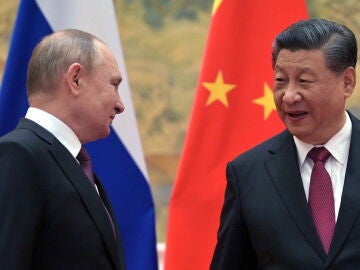
Chinese President Xi Jinping will arrive in Russia next Monday on an official visit three days, as announced by the Kremlin. “The talks will address current issues of the further development of partnership relations and strategic interaction between Russia and China,” the statement said.
For his part, Chinese Foreign Affairs spokesman Wang Wenbin commented at a press conference that Xi’s trip will be “a peace visit”and that Beijing “will maintain its objective and fair position on the Ukraine crisis” and “play a constructive role in promoting peace talks.”
“The visit will be about friendship and aims to deepen mutual trust between the two countries. The two leaders will exchange views on their pragmatic cooperation and common concerns, and will continue to push for connectivity based on the projects of the New Silk Roads and the Eurasian Economic Union,” Wang said.
Also, both countries will work for “jointly safeguard the stability of the industrial chain, deepen exchanges at all levels to consolidate their friendship, promote cooperation and inject more positive energy into the world economic recovery,” according to Wang.
Meanwhile, the Kremlin has assured that both leaders will discuss on “current issues” related to the “future development of the comprehensive partnership and strategic cooperation between Russia and China”. China insists that the close relations between Beijing and Moscow “do not threaten any country” and “advance the multipolarization of the world.”
Last year, Xi and Putin strengthened their ties a few days after the war broke out in Ukraine, on which Beijing has maintained an ambiguous position asking “respect for the territorial integrity of all countries“, including Ukraine, and “attention to the legitimate concerns of all countries”, referring to Russia.
Beijing recently issued a statement on what he calls “conflict” in Ukraine in which he defends respect for the sovereignty of all countries, the abandonment of the “cold war mentality” and a ceasefire. He also called for “moderation” to “prevent the situation from getting out of control” and leading to a nuclear conflict, a proposal criticized by the West for putting “the aggressor and the victimized” on the same level.
Beijing has not explicitly supported Moscow but has opposed sanctions against Moscow because “they don’t solve the problems”. During a meeting held in Uzbekistan late last year, Putin appreciated the fact that Beijing has always maintained “a balanced position” on Ukraine, although he acknowledged “questions and concerns” from China.
Source: Lasexta
Ricardo is a renowned author and journalist, known for his exceptional writing on top-news stories. He currently works as a writer at the 247 News Agency, where he is known for his ability to deliver breaking news and insightful analysis on the most pressing issues of the day.











